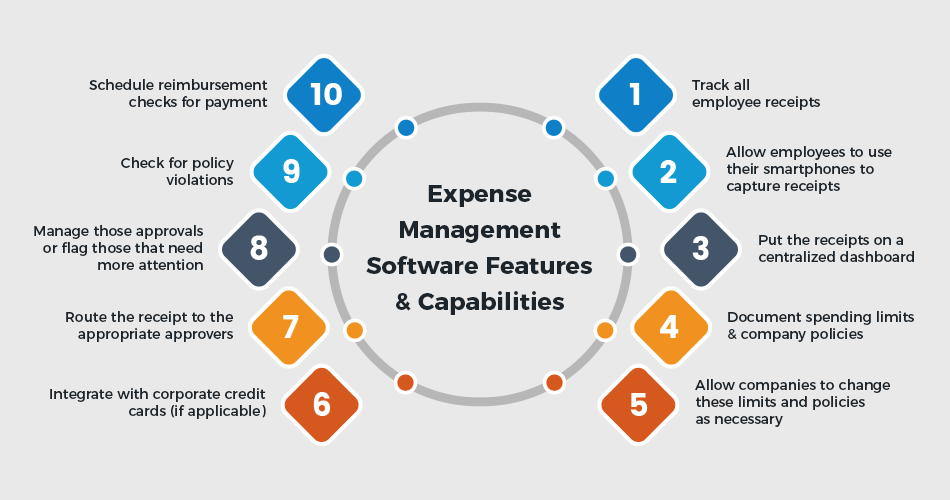46% of companies do not track expense reporting costs, and 43% do expense reporting manually. These outdated practices cause inefficiencies, blunders, and fraud risks. Advanced tools like NetSuite Expense Management have become essential for today’s fast-paced business. Automating and simplifying expense processes increases compliance, accuracy, and productivity with corporate policies for businesses.
This blog explains how NetSuite expense management addresses common issues and transforms expense management into a competitive advantage for any size company.
What is NetSuite Expense Management?
NetSuite expense Management can make Expense reporting easy. It automates submissions and approvals and integrates with project accounting and invoicing for better management.
Users manage expenses from anywhere with the NetSuite mobile app. The system provides customized workflow and approval process customization for particular business requirements. Expenses sync with NetSuite ERP to eliminate redundant data entry and enhance accuracy.
The solution also provides credit card integration and mobile support for issues, including manual tracking and disjointed approvals, to enhance forecasting and financial accuracy.
Why Expense Management is Important for CFOs and Business Owners?
For several reasons, expense management is of prime interest to CFOs and business people :
- Better Financial Control: Effective expense management enables CFOs to better control financial outflows. This visibility helps with matching spending to company budgets and financial strategies.
- Increased Cost Efficiency: By examining and managing expenses, businesses can see where they can bring down costs without compromising quality or productivity. This increases the cost efficiency and profitability.
- Better Policy Compliance: An expense management system enforces company spending procedures. It makes certain that all expenditures satisfy internal guidelines and external regulatory requirements.
- Make Processes Simpler: Automated expense management programs shorten the effort and time needed to prepare expense reports. This simplifies activities and frees staff to work on much more strategic things.
- Reduces Fraud & Errors: A structured expense management reduces the risk of bogus claims and human errors. This protects the company’s finances and also its image.
- Aids to Decision Making: CFOs and business people can make educated choices with accurate, timely expense data. This data might drive budget adjustments, resource allocation, and strategic planning.
- Facilitates Faster Reimbursement: For employees, a far more clear expense management procedure means quicker reimbursement. This increases employee satisfaction in addition to trust in the organization.
- Supports Scalability: Growing businesses have more complicated financial operations. A highly effective expense management system can scale with the company’s growth without losing financial integrity or efficiency.
- Improves Financial Forecasting: Financial forecasting requires reliable expense data. It helps to predict future spending and control cash flow.
Key Features of NetSuite Expense Management

Integration with NetSuite ERP
The expense management system integrates directly with NetSuite ERP, and all expense data is fed into the ERP system without duplex data entry. This integration saves time, enhances information accuracy, and facilitates financial analysis and reporting.
Customization Options
NetSuite supports extensive customizing for workflows and approvals. This flexibility enables businesses to customize the expense management system to suit their specific project accounting, expense policy, and other needs. Customized processes help expense management meet an organization’s operational standards and procedures.
Simplified Approvals & Workflows
The tool automates and incorporates the approval processes, notifying the appropriate stakeholders directly. This expedites the approvals and also ensures all expenditures are examined and approved by the appropriate personnel, reducing bottlenecks and enhancing spending policy compliance.
Credit Card Integration & Mobile Support
Credit card transactions and complete mobile support integrate expenses from company cards into the system. This removes manual entry errors and allows mobile employees to monitor and report expenses in real time.
Challenges NetSuite Expense Management Solves
NetSuite Expense Management addresses several key challenges facing businesses when managing expenses. It tackles inefficiencies, visibility, and control via a complete, automated solution.
Here are some particular challenges that NetSuite Expense Management can help with:
Manual Processes & Inefficiencies
NetSuite manages all expense management from submission to approval. This automation saves effort and time on manual entries and revisions.
The intuitive interface and mobile compatibility make operations simpler and expense reporting quicker and free of mistakes, boosting productivity.
Visibility & Control Of Business Expenses Lack
With this financial tool, CFOs and business managers get real-time summaries of company-wide expenditures via reports and dashboards.
This visibility enables monitoring and controlling spending patterns. Real-time data access means financial leaders can react fast to dynamic spending changes.
Expense Policy Compliance & Audit Risks
The system supports customized rule-based workflows that enforce company expense policies automatically. This reduces the risk of non-compliance and facilitates audit procedures.
By enforcing guidelines on all expenses and keeping records for each transaction, NetSuite helps avoid audit and compliance issues.
Scalability
Along with growing businesses comes much more complexity in expense management. NetSuite is flexible and can handle increased volumes of expenses without sacrificing accuracy or performance.
Benefits of Using NetSuite Expense Management
1. Power Employee Productivity
Employees submit expenses from any place using an internet browser or mobile device. This is helpful for remote teams and individuals who often travel for business so they can report their expenses without delay and go on working on productive things.
2. No Delay in Repayments to Employees
With simplified and automated procedures, expense approvals and reimbursements tend to be quicker. Workers receive their repayments more quickly, which may boost morale and relieve economic stress – particularly for staff members with high out-of-pocket expenses.
3. Less Delays and Errors
Human errors like duplicate entries and incorrect amount submissions are reduced by automating the expense management process. NetSuite integrates with ERP to get rid of mistakes and lateness from manual data entry.
4. Increased Efficiency in Operations
NetSuite’s expense management solution automates workflows and approvals for operational efficiency. This automation relieves the administrative burden on personnel, enabling them to concentrate on strategic activities instead of on regular information processing.
5. Expense Policy Enforcement
Customizable workflows enforce corporate expense policies automatically. By developing rules that match company policies, NetSuite ensures that submissions follow internal guidelines, maintain budget controls, and stop unauthorized spending.
6. Visibility Improvement
Real-time dashboards and reporting give executives and finance teams a pulse on the company’s financial outflows. This increased visibility enables much better budget management, planning, and forecasting so leaders can make sound financial decisions.
7. Better Fraud Prevention
The system’s ability to combine credit card data and enforce policy compliance helps detect and stop fraudulent activities. By performing audits and monitoring expenses in real time, the system can quickly find and address any problems, reducing the risk of fraud.
8. Simplified Reporting
NetSuite Expense Management provides integrated reporting tools. They enable businesses to produce detailed expense reports and analyze spending to make needed adjustments in their financial strategies.
9. More Compliance
NetSuite tracks and documents all financial transactions to ensure they meet applicable regulations and laws. This compliance is important to avoid legal penalties and keep a great corporate image.
10. Flexible & Customizable
The platform’s flexibility to personalize workflows and approval procedures means it can support various business models and industry demands. Whether it’s project accounting or general expense management, NetSuite is scalable to fit any organization’s specific operational requirements.
11. Improve Efficiency and Accuracy
The system eliminates double data entry by making expense information flow into NetSuite ERP automatically. This integration removes the errors and offers one source of truth for financial data.
NetSuite Expense Management Software Cost
NetSuite is billed on an annual basis and also includes a primary platform fee, optional modules, and operator licenses, plus an implementation setup charge per user per year.
The expense management capabilities are available as part of the SuiteProjects module. NetSuite is scalable, meaning new users and modules can be added as a business expands.
Why Partner with VNMT?
Choose VNMT for expert guidance and integration to your company for NetSuite Expense Management implementation. Our certified professionals have extensive experience with NetSuite implementations.
We customize solutions, provide constant support, and provide training to make sure your company gets the best from NetSuite. With VNMT, you get a partner to enable you to enhance your expense management procedures & accuracy and productivity.

The Bottom Line
NetSuite expense Management Software is a vital tool for CFOs and financial specialists to simplify Expense reporting. By automating and streamlining expense management, NetSuite enhances compliance, efficiency, and accuracy. Its customizable workflows, real-time visibility, and better fraud prevention help businesses keep closer financial control and make sound decisions. The business landscape is always evolving, so complex solutions like NetSuite are becoming crucial. Get in touch with us for NetSuite Implementation Services.
















